NEWS PAGE

Bakara Market Report
SIPAM Institute launches a report on “Bakara Market: An economic hub for Somali enterprises” at Afrik Hotel in Mogadishu. Representatives from the business community led by Chair of Bakar Market, government officials, Member of Parliaments, academicians, youth, women and civil society attended the event.
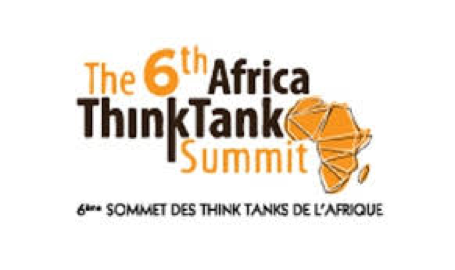
Africa Think Tanks
SIPAM supported a call made by African think tanks who held their 6th summit in Nairobi, Kenya. They have called African governments, private sector, & other non-state actors to collaborate with think tanks so that home-made solutions are provided to policies and programs implementation challenges.
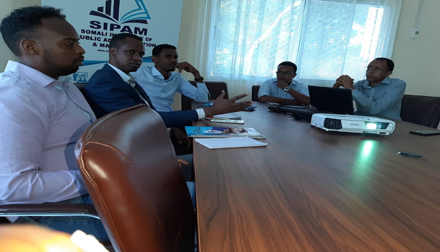
Directorate of National Statistics
SIPAM Institute and Open Knowledge Somalia held a consultation meeting with the Directorate of National Statistics of the Ministry of Planning, Investment and Economic Development.

International Partners
SONSA along with SIPAM met with Raisedon Zenenga, Deputy Special Representative of the Secretary-General for Somalia, Ben Fender, British Ambassador to Somali, and AU Special Representative for Somalia, Ambassador Francisco Caetano Madeira. The parties discussed how to enhance the working relationship between Somali civil society and international partners.

SIPAM Institute attended the launch of a report
SIPAM Institute attended the launch of a report entitled "Doing Business in a War Zone: Somali Banks and Telecoms Providers" published by Hiraal Institute. The Executive Director of SIPAM Institute applauded the good work of Hiraal Institute and emphasised on the importance of research in policy making.

Multi-Stakeholder Forum
SIPAM Institute attended the Multi-Stakeholder Forum on Somalia Human Capital Development Strategy .

Training on "The Board of Directors as Fundraising Visionaries"
SIPAM Institute offered a training on "The Board of Directors as Fundraising Visionaries" to Board members of the Somali Non-State Actors SONSA in Mogadishu.

The 4th Conference on Economics
The Executive Director SIPAM Institute graced the 4th Conference on Economics, Public Policy and Administration as a Keynote Speaker and made a presentation on "Can Somali potential oil reserves spark economic development?” The Conference was organized by SIMAD University and was held at Marhaba Hotel, Mogadishu.

Judy Ngina, presents a research paper on the Economic role of cooperatives
Judy Ngina, on behalf of SIPAM Institute, presents a research paper on the Economic role of cooperatives: Key economic issues and potential for development at the 4th Conference on Economics, Public Policy and Administration held at Marhaba Hotel in Mogadishu. The conference was organized by the Centre for Research and Development of SIMAD University.

SIPAM Institute prepared a research paper
SIPAM Institute prepared a research paper on the economic impact of Somali cooperatives to be presented at the 4th Conference on Economic Public Policy and Administration Development organized by SIMAD University.

Consultative meeting
SIPAM Institute held a consultative meeting with management representatives from Hormuud University aimed at establishing a working relationship geared towards the attainment of performance excellence in academia.

Open Knowledge Somalia and IT experts joined SIPAM
Open Knowledge Somalia and IT experts joined SIPAM for a preliminary meeting on establishing data needs, currently available data and the present actors in Somalia.
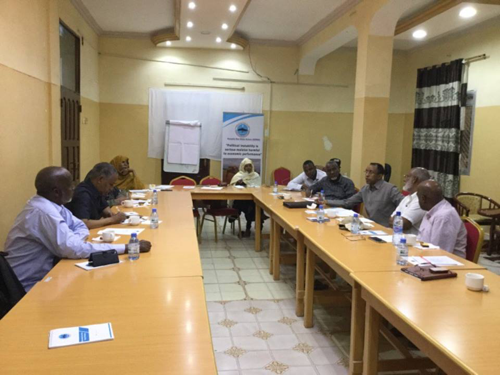
SIPAM Institute attended a roundtable discussion organised by the Somali Non State Actors (SONSA)
SIPAM Institute attended a roundtable discussion organised by the Somali Non State Actors (SONSA). Participants discussed the challenges and consequences of measures taken to curb rising insecurity including road blocks which go for hours or sometimes for days consequently hindering public movement.

Students from Jobkey University pay a visit to SIPAM Institute
Students from Jobkey University pay a visit to SIPAM Institute for a familiarization and networking session aimed at equipping them for the graduate career ladder .

The Executive Director of SIPAM Institute visited City University
The Executive Director of SIPAM Institute visited City University in Mogadishu and had a successful classroom discussion with political science students.

SIPAM Institute held a focus group discussion
SIPAM Institute held a focus group discussion bringing together stakeholders with a wealth of knowledge on cooperatives in Somalia to inform our upcoming conference paper on re-establishing cooperatives in Somalia.

A consultative meeting organized by National Independent Electoral Commission (NIEC)
SIPAM Institute attends a voter registration consultative meeting organized by National Independent Electoral Commission (NIEC) where interesting presentations on different voter registration methods were made.

A consultative meeting
A consultative meeting between Open Knowledge Somalia, an affiliate to the Open Knowledge Network and SIPAM Institute aimed at furthering discussions on addressing data gaps, needs and availability in Somalia.

Training on ow to prepare for the job market
SIPAM Institute held a training dubbed “how to prepare for the job market” aimed at equipping finalist students and graduates from local universities with skills to prepare them for the job market.
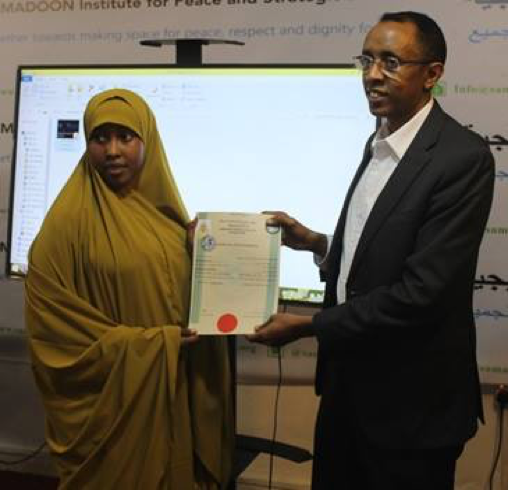
Executive Director of SIPAM Institute presented certificates to heroines of peace
Executive Director of SIPAM Institute presented certificates to heroines of peace who completed a peace building training.

Executive Director of SIPAM Institute made a presentation in supporting programs
Executive Director of SIPAM Institute made a presentation in supporting programs that invest in local youth forum held at SAMADOON Institute for Peace and Strategic Studies.

Workshop on Strategic Planning
SIPAM Institute held a workshop on Strategic Planning for Political Parties in Mogadishu.
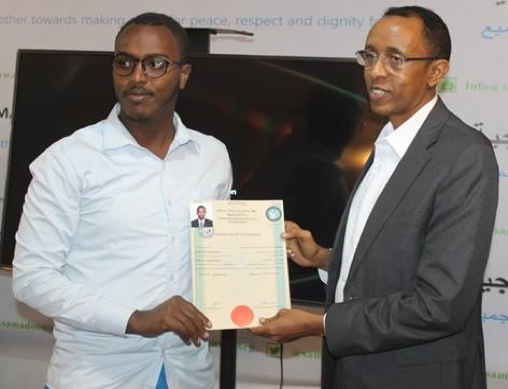
Executive Director of SIPAM Institute presented certificates
Executive Director of SIPAM Institute presented certificates to participants after the completion of training on reflective structure dialogue.

Training on "How to sell yourself at the job market"
SIPAM Institute and Mogadishu Employment Agency facilitated a training on "How to sell yourself at the job market" to enhance youth employability.

Key Informant Interviews
SIPAM hosted and conducted Key Informant Interviews on Hassan Mire, the Chairman of Bakara Market and Odowaa, as part of our upcoming Bakara market report.

SIPAM attended the Annual Forum for Ideas 2018 held in Djibouti
SIPAM attended the Annual Forum for Ideas 2018 held in Djibouti. It was a forum that was full of new ideas, inspiration, old friends and provided a platform for new connections among Somalis from across the world.

SIPAM Institute makes a presentation
SIPAM Institute makes a presentation at a stakeholder consultative meeting on Somalia's National Anti-Corruption Strategy held in Mogadishu.

Discussion
SIPAM Institute held a discussion with a representative from the Somali Federation of Trade Unions.

SIPAM Institute released a policy brief
SIPAM Institute released a policy brief that gives recommendations and strategic approaches necessary for combating the corruption menace in Somalia.

Strategic Planning session
SIPAM Institute facilitates a Strategic Planning session for one of the Political Parties in Somalia.

Strategic Planning session
SIPAM publishes an article that examines the status, opportunities and challenges in the Somali remittance industry.

Report: The challenges faced by the Somali remittance industry.
SIPAM Institute published a report that explores the challenges faced by the Somali Remittance Industry, gives practical recommendations that could address these challenges ailing the industry and provides evidence to inform policy.

Networking Night
SIPAM was the gold sponsor of the 8th episode of Business Networking Night held at the Marhaba Hotel on 30th November. The Business Networking Night is a forum that brings professionals together and gives them a platform to engage, learn and share meaningfully.
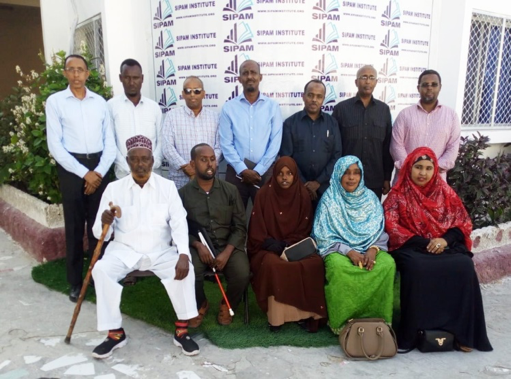
Workshopt
SIPAM conducted a successful strategic plan development workshop for stakeholders of the Union of Peace and Democracy Party (UPD).

SIPAM had the honor of hosting Dr. Ibrahim Abikar Noor
SIPAM had the honor of hosting Dr. Ibrahim Abikar Noor to share deep insights on the current situation of post-conflict Somalia informed by his recently completed research on “Addressing the lack of evaluation capacity in post-conflict”.
.

Public-private dialogue meeting
SIPAM attends the public-private dialogue meeting aimed at stepping up relations between stakeholders from the private and public sector.

Somali National Economic Policy Forum
The Executive Director of SIPAM Institute attends the Somali National Economic Policy Forum in Mogadishu.
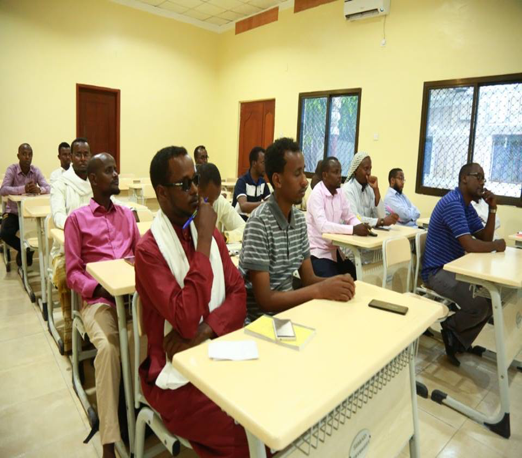
Public Talk
Executive Director of SIPAM Institute delivers a public talk to postgraduate students at SIMAD University.

SIPAM Institute hosts public service
SIPAM Institute hosts public service practitioners for a stakeholder brainstorming session on citizen participation in democracy.

Transforming Mogadishu in an Age of Smart-city and Interconnectivity
The Executive Director of SIPAM Institute, alongside other panelists, discusses “Transforming Mogadishu in an age of smart-city and inter-connectivity” at the Mogadishu Tech Summit.

Policy Brief
SIPAM released a policy brief titled, “Empowering Somali Women: Are we there yet?’’ The policy brief highlights and recognizes achievements of the Somali woman to date and foregrounds the daily challenges they still encounter, offering actionable policy recommendations to ensure inclusivity in quest of attaining sustainable development.

Human Capital Development Mechanism for Somalia
SIPAM participated in a consultative forum organized by Heritage Institute aimed at establishing and developing mechanisms for human capital development in Somalia. The three day forum brought together ministers, academicians, civil society and practitioners in a bid to share insights and forge an appropriate way forward.

Qualitative Research Training
SIPAM organized and facilitated two sessions of qualitative research training at SIMAD’s Gaheyr Campus. The training was aimed at empowering junior researchers and graduates with knowledge and technical knowhow of carrying out successful qualitative research right from sampling, data collection and analysis through to report generation.

Partnerships and linkages
In pursuit of strengthening the institutional capacities of Somalia’s public service, SIPAM and the Ministry of Constitutional Affairs held a brainstorming session aimed at identify areas of possible partnership which brought together the technical advisory team of the Ministry and representatives from SIPAM.

Organizational Capacity Assessment
SIPAM conducted a successful organizational capacity analysis for Somali Union of Cooperative Movement (UDHIS), the apex organization of cooperatives in Somalia. The forum provided an opportunity for participants, including the UDHIS board of Directors and sectorial heads, to have a deeper reflection of their organizational vision and develop strategic measures towards attaining that vision. Top on agenda was change readiness analysis, SWOT and PEST analyses.

Partnership between AAPAM and SIPAM.
Partnerships propel and amplify impacts of organizations. In its pursuit of research excellence, Somali Institute of Public Administration and Management has signed a Memorandum of Understanding with African Association of Public Administration and Management (AAPAM), an international organisation that gives a platform for articulation and dissemination of ideas on capacity building and a wide range of research thematic areas.

SIPAM attends reconciliation Conference
.
Representatives from SIPAM attended the Consultative meeting organized by the Ministry of Interior, Federal Affairs and Reconciliation on the establishment of the national reconciliation process by the civil society. The consultative meeting laid the base for national cohesion, integration and healing process aimed at reconciling and bringing long-lasting stability in the country. SIPAM pledged to work with all the stakeholders in attendance and to support the reconciliation process in its entirety.

Consultative meeting between iRise and SIPAM.
Somali Institute of Public Administration and Management attended a consultative meeting with iRise aimed at understanding the areas of operation for each organization and establishing areas of possible partnerships in the future. iRise is a technology centre that aims to empower young entrepreneurs and innovators through technological research and consultancy.

Stakeholder Meeting with the Ministry of Information
.
Reaching out to clients and providing end to end solutions through consultancy, research and assessment is one of our core objectives. SIPAM and the Ministry of Information, Culture and Tourism met with the aim of carrying out a Needs Assessment, evaluate the ministry’s SWOT analysis and establish appropriate working linkages and partnerships.

Publication of Policy Brief.
The policy brief titled “Standardization of Higher Education Sector in Somalia” emphasizes on the need to reconstruct higher learning centres and to standardize the quality of education offered in universities. to meet the global standards of education in order to produce an efficient human resource. The brief has been shared with the Ministry of Education and other stakeholders in the education sector for the implementation of its recommendations.

Helping CSET to enter into partnership with FOA.
SIPAM does not only advocate for partnerships for itself, it also helps and facilitates for other organizations to achieve their full potential through partnerships. SIPAM facilitated the meeting between FAO Somalia and the Cooperative Society of Somalia (UDHIS) to establish areas of collaboration and form a working relationship. Through this working relationship, FAO Somalia and CSET will join hands in their quest to enhance the socio-economic transformation of small-scale fisheries.

“SIPAM attended co-operative stakeholder meeting held at the Co-operative University of Kenya.”
SIPAM acknowledges the need for collaborative efforts and partnership building as one of its key strategies of societal transformation. We welcomed UDHIS (A Somalia Cooperative Society’s umbrella body) and started on a journey that will see the two organizations foster a stronger working relationship. SIPAM through its linkages in Kenya oversaw UDHIS representative’s visit to the country to meet various stakeholders in the cooperative field and to share experiences and workable models to growing cooperatives in the respective countries. The exchange visit to various institutions stands to offer opportunities for strategic and formalised partnerships between the organizations and also between the two countries in the Cooperative Society sector.
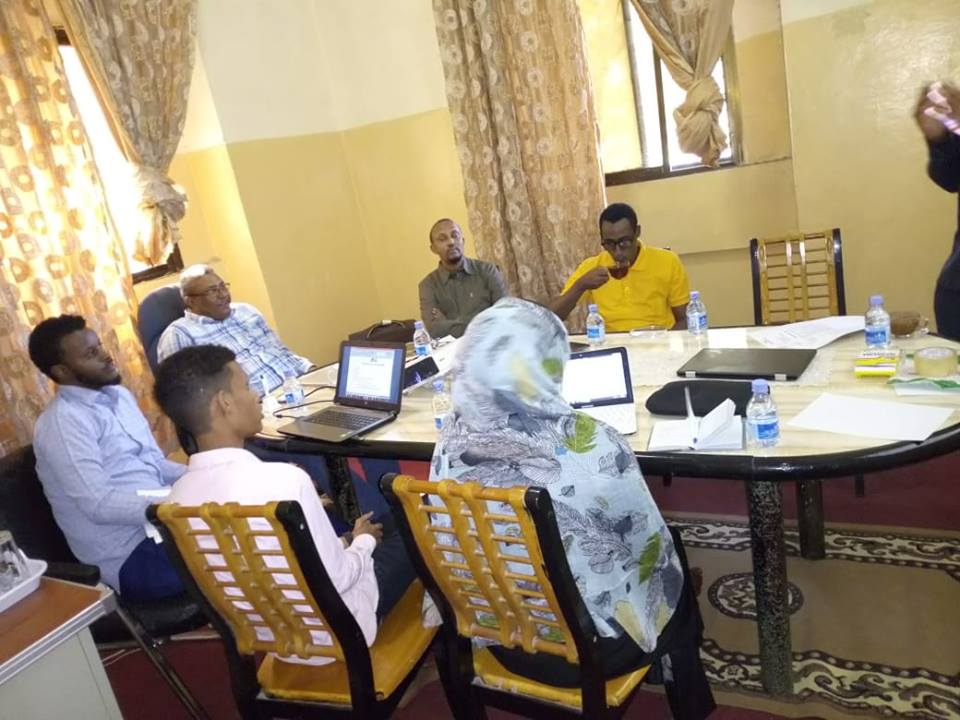
Conducting a change readiness assessment for Centre for Social & Economic Transformation in Mogadishu.
Change is inevitable. In other circumstances, change is actually necessary. Centre for Social and Economic Transformation (CSET), a social enterprise organization that seeks to enhance social and economic transformation among small-scale farmers and fisheries, saw the need for change in order to improve their performance. SIPAM was involved as a consulting company to help CSET undergo the change process. The initial stage for any change process is making an assessment of the preparedness of an organization to undergo the major change. SIPAM organized a Change Readiness Assessment workshop for CSET. The outcome of the workshop report highlighted on the key capacity gaps and made recommendations for implementation based on the identified capacity gaps.

A consultative meeting between Kenya School of Government and SIPAM Institute..
Creating strategic partnerships serves to advance one's course but in the long run benefits all those who are involved. SIPAM does not work in isolation, it brings on board likeminded organizations, institutions, and individuals as it seeks to propel its agenda of supporting effective public service management and reforms through development programs, advisory and consultancy services and research approaches. SIPAM met Kenya School of Government in a bid to identify areas of collaboration and establish an enabling working relationship.

“Youth Deradicalization through Employment”
SIPAM released another policy brief titled “Youth Deradicalization through Employment”. The brief, among other key discussions, looked at the current youth unemployment trends in Somalia, various perceptions on youth employment, the likely socio-economic, political and security impacts of youth unemployment. The policy brief went ahead to suggest critical recommendations to both the government and other key stakeholders on alleviating the current situation. In our quest to influence change and decision making, the brief has been shared with our partners, on our website and various social media platforms, relevant/key government departments, news rooms, authors and other policy actors.

Young Professionals Network (YPN) Forum
SIPAM participated in the recently concluded Young Professionals Network (YPN) Forum for an International conference held in Kisumu themed “Building Accountable and inclusive Institutions: Challenges and Opportunities for African Youth”. the conference, organized by African Association for Public Administration and Management (AAPAM) in collaboration with Ministry of Public Service Youth and Gender Affairs Kenya brought together delegates from Zambia, Tanzania, Kenya and most notably Somalia proudly represented by SIPAM. SIPAM were given a special opportunity to share its experiences, lessons and work in Somalia. In the process, SIPAM managed to use the opportunity to network and initiate discussions towards establishing working relationship with different institutions. Our quest for accountability, inclusivity and efficiency in public administration has seen us scale new heights in building partnerships across borders.

Somali Local-Diaspora Mutual Coexistence: Opportunities and Costs
In June 2018, SIPAM released a policy brief titled “Somali Local-Diaspora Mutual Coexistence: Opportunities and Costs”. The policy brief highlights the need to unite Somali locals and the diaspora to rebuild the country.
SIPAM finds the Somali diaspora has consistently proven to be a double-edged sword, in terms of its impact on the peace and security of the nation. Both the local population and the Somalis in the greater diaspora have shown that they are locked in constant competition for political, social and economic influence.
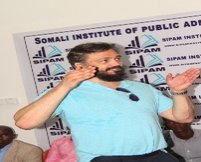
Lars Bjorknas
Lars Bjorknas delivered a renewable energy seminar at SIPAM institute in Mogadishu. The seminar highlighted on the need for Somalia to keep pace with the advancement of technology to tap into the potential of the new renewable sources of energy. Participants of the seminar were particularly impressed by the concept of “green energy” and its role environmental conservation and climate change. The seminar explored issues facing Somali renewable energy sector.

Somali Youth Day celebration
As part of the Somali Youth Day celebration, SIPAM launched a training programme which will provide youth with the necessary skills to become resilient and creative leaders. With over 80 per cent of the country’s 12 million people under 35 years of age. Somalia relies heavily on its youth to carry forward its reconstruction and recovery agendas. The training programme takes multi-dimensional skills and knowledge approach with emphasis on promotion of self-reliance among the youth. The programme emphasizes on providing services and opportunities to support all young people in developing a sense of a competence, usefulness, belonging and empowerment to not only be job seekers but creators as well.

High-quality training, research, and consultancy services
SIPAM has continued in its efforts and quest to provide high-quality training, research, and consultancy services in various fields of governance, public administration and youth empowerment. SIPAM held several seminars and trainings including; renewable energy, youth employability and leadership workshop, entrepreneurship and interpersonal skills and self development. These have gone along way in filling the skills and knowledge gap in those fields. Our core mandate is to build human and governance system capacities; feedback received from the just concluded trainings is proof enough that the simple but well calculated steps will go a long way in realising the full potential the Somali people and its government structures.

National Constitutional Convention
Representatives from SIPAM attended the National Constitutional Convention which ran between 13–15 May 2018 in Mogadishu. This convention was the first the major milestone of legitimising the constitutional process and its outcome. Until now, the constitutional review process has been marred by controversial issues such as ownership, transparency and representation. We both joined hands with all the other delegates in declaring support to the review process in its entirety and a commitment to offer counsel and expert advice from our team of experts and extended networks

SIPAM has helped flood victims of Beletweyn
SIPAM has helped flood victims of Beletweyn where More than 9,000 people were reported to have been displaced following floods. With the extended damage caused by the floods and the risks of water borne diseases, SIPAM engaged its team of volunteers to offer humanitarian assistance through assisting in evacuations, distribution of food, clothing and other basic amenities. Other specialised teams were involved in first aid care and treatment while others worked closely with other humanitarian organizations in carrying out assessment on the level of damage caused by the disaster. SIPAM looks forward to reaching out to its network of friends, well-wishers and partners to donate towards the displaced families in reconstructing the city and its neighbourhood.

SIPAM supports
SIPAM supports students long after their graduation. Graduation does not mark the end of our relationship with students but is the beginning of another stage in which we continue nurturing the graduate to be a better product to the labour market. We continue advising and linking them to further support to increase their knowledge, build their careers and to potential employers. SIPAM offers and facilitates consultations and trainings to enhance skills capacities in various areas.

Building tomorrow’s leaders
SIPAM is committed in building tomorrow’s leaders, through organizing leadership and empowerment forums. It also offers and facilitates training support to students who show potentials for leadership. It also emphasizes on women empowerment to leadership positions through gender mainstreaming.

Investment in Education
SIPAM has called the government to invest more in education if Somali is to have tomorrow an adolescent-competent workforce. SIPAM is ready to partner with the government on this endeavour, by being a link between the government agencies and other stakeholders, providing trainings, consultation and advise on education policies, strategic plans and regulatory programmes.

SIPAM welcomed
SIPAM has welcomed headcount of public service workers. The efforts of the Civil Service Commission and the Federal Government of Somalia will hopefully end ‘public sector of ghost workers. The government could be losing much needed resources through inflated wage bills; this denies the young Somali Government necessary revenue for rebuilding education sector and other sectors. Ghost workers disrupt government programmes.

SIPAM visited HAUS Finnish Institute of Public Management in Helsinki
A delegation from SIPAM visited HAUS in Finland in March 2018. HAUS is a Finnish state-owned company that trains civil servants and improves their skills, and it also participates in different ways in developing state administration organisations. The two institutes discussed institutional cooperation and agreed to form a partnership.

SIPAM met with FUZU
On 27 March 2018, SIPAM team met with Jussi Hinkkanen, CEO of Fuzu. The two parties discussed the talent management needs in Somalia and how the Fuzu platform could be used to improve talent management. Fuzu employment solution uses latest technologies and customized for specific conditions of emerging markets.

SIPAM continues to be a strong leader in the discussion of the role of youth in public sector reforms in Somalia.
SIPAM undertakes different projects that supports public sector reforms. One noteworthy event is a seminar which looks at how youth can develop as individuals, get good education, find decent work and become active partners of government in fostering a culture of good governance.

Board Member of SIPAM calls for investment in education and training
Awale Ahmed, Board Member of SIPAM, calls on public servants to pay more attention on education security. Addressing under investment in education, Awale said that the government needs to introduce programs that will be geared towards the following:

Data collection efforts underway
One of the main challenges that are facing Somalia today is the world’s knowledge base on Somalia’s resources which is too outdated, incomplete and inadequate to provide insight on what directional development efforts should take. SIPAM is giving youth a training course that focuses on qualitative research methods. Students are given research assignments once they become familiar with research tools and techniques. One of the researches that SIPAM is currently undertaking is the renewable energy sector in Somalia which will be published at the last quarter of 2018.

